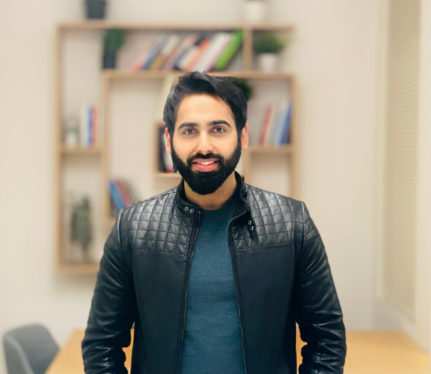Gatik is something of an outlier in the autonomous vehicle space. Whereas most companies are either trying to scale robotaxis or commercialize long-haul self-driving with Class 8 trucks, Gatik is more focused on smaller box trucks and middle-mile logistics.
Gatik CEO and co-founder Gautam Narang said there are two main reasons behind this go-to-market strategy. First, an autonomous solution for middle-mile logistics solves specific customer problems. Second, it’s a solution that can be deployed at scale, with no driver behind the wheel today — not in five years.
Gatik is the third company that Narang and his brother, Arjun, founded together. Their first company was in Delhi, India, a medical robotics startup that focused on the rehabilitation of stroke patients using robotic arms. The problem was that labor is cheap in India, and rehab centers and hospitals didn’t see the need for an expensive and unsociable robotic arm when they could hire nurses.
Narang said he and his brother took that lesson to heart and decided not to create technology for technology’s sake, but rather to focus on validating the real customer pain point.
The customers, in Gatik’s case, were grocers and retailers that were struggling to meet the expectations of the end consumer for same-day delivery. Those expectations have already created a shift in the logistics chain that Gatik has been able to grasp onto.
Gatik defines “middle mile” as distances or routes up to 300 miles. The company has around 40 trucks today that move goods in a hub-to-spoke model (rather than a hub-to-hub model) from a distribution center to microdistribution centers and from those centers to multiple retail locations.
Today, Gatik does daily driverless operations with Walmart and Georgia-Pacific in the U.S. and Loblaw in Canada.
We sat down with Narang to learn more about why Gatik doesn’t do free pilots or accept short-term partnerships, the importance of knowing your customer and what investors are looking for in today’s funding environment.
You and your co-founders have strong backgrounds in robotics. What made you want to pursue the box truck approach to self-driving technology?
Matching the customer needs to what was possible from a technology standpoint is how we started the company. When my co-founders and I decided to start Gatik, the criteria we had in mind was firstly starting with a real customer pain point. Back in 2015, 2016, many companies in our space were approaching this problem mainly from a technology angle, building technology for technology’s sake. The thinking was, we’ll figure out the tech and then worry about the use case and business model later. We wanted to do things differently.
Second, we wanted to focus on an application that was more near term, so that’s how we went after this middle-mile or B2B short-haul segment of the supply chain.
The insight we had was the world of supply chain logistics is moving closer to the end consumer. The online grocery segment was growing like crazy, but making that two-hour or three-hour delivery window was becoming more challenging for the grocers and retailers. In an effort to be able to meet that delivery window, they were moving their supply chain to the end consumer by building out microdistribution centers.
All this is to say the routes were getting shorter but more frequent, and the size of the trucks was getting smaller, as well. So that’s how we came up with the category of Class 3 to 6 vehicles going after this mid-mile. And the best part about this mid-mile was we had to operate the trucks back and forth on fixed and repeatable routes. The whole idea was, let’s not try to solve autonomy over a large geofenced area. Rather, let’s focus our efforts on these fixed and repeatable routes, overoptimize the technology for these routes and get to the point of driver-out faster and safer than the competition.
How fixed are these routes? Are your vehicles just driving from point to point?
We’re still operating Level 4 autonomy, but yes, the operational domain is narrower compared to a company that’s going after robotaxi or last-mile delivery. Instead of going after, let’s say, a large geofenced area like the city of San Francisco, we operate our trucks back and forth on these repeatable routes.
Today we are the only autonomous trucking company doing daily commercial deliveries on public roads without anyone on board. When we started out, we were doing shorter routes, like less than 10 miles point to point, so moving goods from one warehouse or distribution center to one retail location. Over the last few years, the technology has matured to a point where we can do pickups from multiple nodes and do deliveries to up to 50 retail locations as well as any combination in between.
To give you an example of a partnership where we’re doing exactly this is with Georgia-Pacific. So in Dallas, Gatik is moving Georgia-Pacific paper products from one of their distribution centers (DCs) to a network of 34 Sam’s Club locations. So on a daily basis, the exact route changes, and we are touching about five to seven stores. As long as the network is manageable and the routes are known and repeatable, we can handle those kinds of networks.
That’s how we think about our business as well. We focus on specific routes where the technology is solvable today, we get to the point of validation where we can take the driver out, and then we do that again across other markets.
Gatik’s Gautam Narang on the importance of knowing your customer by Rebecca Bellan originally published on TechCrunch
https://techcrunch.com/2023/03/07/gatiks-gautam-narang-on-the-importance-of-knowing-your-customer/



